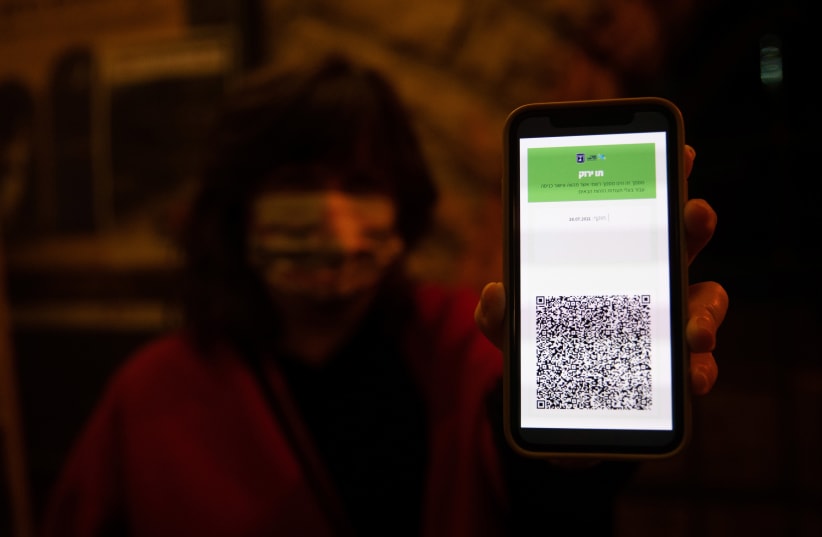The passport system made waves internationally after it was successfully introduced in Israel and the Jewish state's "green passport" system allows those who have been inoculated to go to restaurants and attend public gatherings and other events that were previously closed due to the pandemic and lockdown restrictions.
But which states in the US plan to follow this approach, and which have come out against them?
NEW YORK
New York became the first state to roll out a vaccine passport. Called "Excelsior Pass." The program was launched in March and was made available through an app that displayed a person’s vaccination status. The NY pass could also be used to prove a recent negative COVID-19 test, which would allow the owner to enter events or businesses, New York Gov. Andrew Cuomo said, according to The New York Post.
Venues such as Madison Square Garden and the Times Union Center in Albany have also started using the Excelsior Pass and other, smaller venues are expected to soon follow suit.
HAWAII
Hawaii is currently making preparations to rollout its passport and the necessary technology is now being tested, Hawaii Gov. David Ige explained, the Honolulu Star-Advertiser reported Monday.
Ige told the Hawaii news outlet that the technology is being provided by companies CommonPass and CLEAR, but a rollout "won't happen for at least four weeks or so."
NEW JERSEY
A plan is not yet in place for the state, but in late March, Gov. Phil Murphy voiced his support for such a system. He added, however, that "I don't want anyone to think that we're up here pounding the table, to think that this is something we unquestionably support. The CDC is the place that that discussion and that guidance has to come from," according to Patch.com.
ILLINOIS
A passport has yet to be rolled out in the state, but Illinois Gov. JB Pritzker has come out in support of them. However, he does not think they should be required.
"As long as it is your choice," Pritzker said, according to news site Patch.com. "If people ask you to show that for a particular venue or private venue, they have the ability and right to do that. You don't have to show that to them. You don't have to be to go to that venue or be engaged in that activity."
PENNSYLVANIA
Currently, there is no plan in place to implement a vaccine passport program in the state, but Gov. Tom Wolf has said he would support one if the legislature gave him a plan, saying implementation should be "relatively easy," according to local NBC affiliateWGAL.
However, there is opposition in the state legislature, with a group of state senators working to introduce legislation to ban a program from being implemented, WGAL reported.
TENNESSEE
Tennessee Gov. Bill Lee has been vocal in his opposition to vaccine passports. Taking to Twitter on Tuesday, Lee tweeted that "The COVID-19 vaccine should be a personal health choice, not a government requirement."
NEBRASKA
Since March, Nebraska has vowed that the state will take no part in any vaccine passport program.
Writing on Twitter, Nebraska Gov. Pete Ricketts railed against the very concept of a vaccine passport, which he claimed "violates two central tenets of the American system: freedom of movement and healthcare privacy."
TEXAS
Gov. Greg Abbott has made his opposition to vaccine passports a matter of policy, signing an executive order Tuesday banning any state agency or an organization that receives state funding from requiring COVID-19 passports, The New York Post reported.
Abbott reiterated his views on Twitter that COVID-19 vaccines are voluntary and aren't an obligatory measure, and likewise, no Texan should be forced "to show proof of vaccination and reveal private health information just to go about their daily lives."
FLORIDA
Like his Texas counterpart, Florida Gov. Ron DeSantis signed an executive order against COVID-19 vaccine passports last week but the Florida ban on vaccine passports goes further than in Texas, with all businesses prohibited from requiring one, according to The New York Post.
“It’s completely unacceptable for either the government or the private sector to impose upon you the requirement that you show proof of vaccine to just simply be able to participate in normal society,” DeSantis had said, according to The Post.
GEORGIA
While the state has not issued an executive order, Georgia is arguably one of the most vocal opponents of vaccine passports.
Gov. Brian Kemp voiced his opposition to passports on Twitter, writing: “I do not and will not support any kind of state-mandated vaccine passport. While the development of multiple safe, highly effective COVID-19 vaccines has been a scientific miracle, the decision to receive the vaccine should be left up to each individual.”
Similarly, Georgia Congresswoman Marjorie Taylor Greene also drew controversy for her opposition to vaccine passports, calling them US President Joe Biden's "Mark of the Beast" and said that any company requiring one would be engaging in a practice she had dubbed "corporate communism."
FEDERAL GOVERNMENT
For its part, the US federal government has promised that they would not impose or support a mandatory COVID-19 vaccine passport system. At a briefing on Tuesday, White House Press Secretary Jen Psaki promised that: “there will be no federal vaccinations database and no federal mandate requiring everyone to obtain a single vaccination credential.”
The Biden administration is working on a set of standards for the many private firms making passports, but that seems to be as far as the US government will go.
